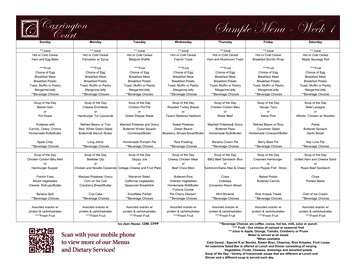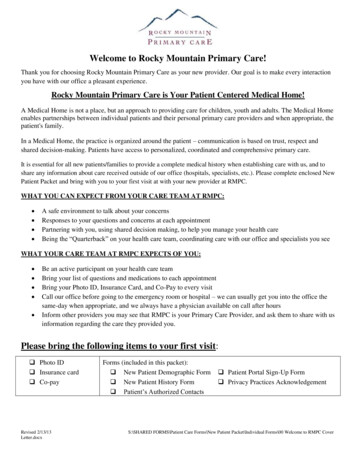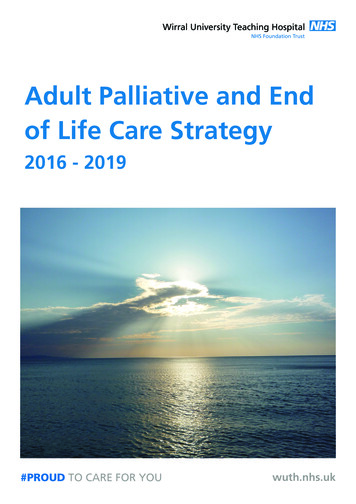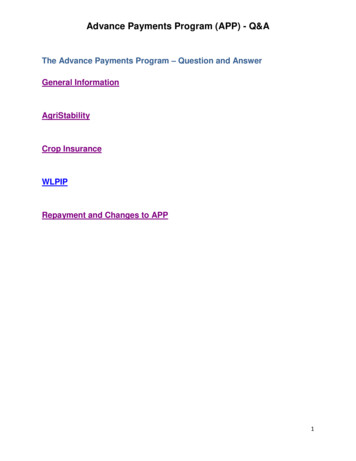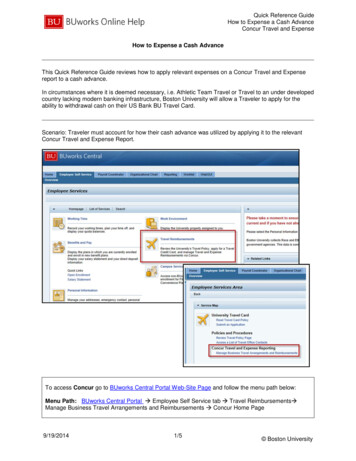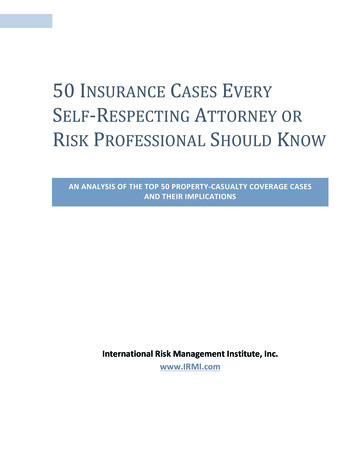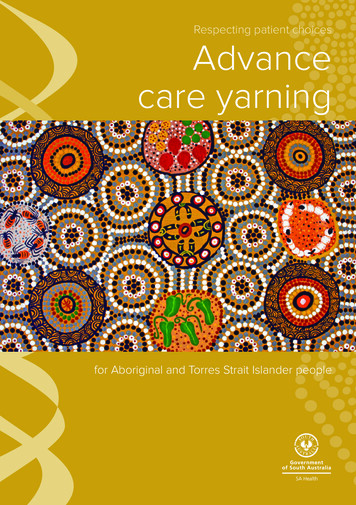
Transcription
Respecting patient choicesAdvancecare yarningfor Aboriginal and Torres Strait Islander people
The information in this booklet is copyright Austin Health, provided by SA Healthfor your information.page 2
Take time to consider.Imagine the following:You are in a road accident and you suffer a severe brain injurywhich leaves you permanently unconscious. You have noawareness of your environment, yourself or other people and youare reliant on others for all your needs. It is not expected that youwill regain consciousness but, with full time nursing care, you willbe kept alive for an indefinite period of time.orYou are diagnosed with a dementia, such as Alzheimer’s Disease- a progressive disease of the brain that affects your thinking andbehaviour. This means that you would not be able to understandwhat happens to you, nor communicate the treatment you want ifyou developed a serious illness.orYou are in hospital with incurable cancer and your heart stopsbeating (cardiac arrest).Think about the treatments that you would or would not want inthese situationsIf something like this happens it is helpful for your family and thedoctors, nurses and Aboriginal Health Workers to know your valuesin life, and your attitudes towards medical treatment.There may be some circumstances where you would want all thetreatments that can possibly be offered to you. In other cases, youmay feel strongly about not being treated with certain things liketube feeding, a breathing machine, antibiotics, blood transfusion,dialysis or cardiac massage.page 3
These are the sorts of things to talk to your family about, to helpthem make decisions if a time came when you were unable todecide.Having a say about your future medical treatment is calledadvance care yarning. It enables you to clarify your values andchoices, and gives your family, doctors, nurses and AboriginalHealth Workers the opportunity to respect your choices.It may be hard for you to face some of the questions andinformation, but thinking about the medical treatment that isimportant to you is no different to putting thought into your lifeinsurance, your will or planning for many aspects of your future.Talking about dying may make us feel uncomfortable, but we alleventually need to plan how we want to live near the end of ourlives.page 4
A dilemmaAunty was an independent 65-year-old widow. She was fairlyhealthy and enjoyed the company of her family and the communityshe lived in. Aunty moved to the city almost 20 years ago to livewith her man and his family in his community. Aunty’s man passedaway two years ago. When his family organised the funeral they, atAunty’s request, reserved a place for Aunty to be buried with herman when her time came.A year ago, Aunty got really sick and passed away. Her family werenotified from her community and invited to attend the funeral inthe city. Aunty’s family were not happy that Aunty was not beingburied on her own land and demanded she be returned to hercommunity for sorry business and burial. Her other family in thecity wanted to fulfil Aunty’s wishes to be buried with her man inthe plot reserved for her.Sadly, neither side of her family would agree, so a court order wassought after which took almost two months. If Aunty’s wishes werewritten down it would have been clear to everyone. As it stands,now Aunty’s two families do not get along and both blame theother for Aunty’s delay in being buried.Having an advance care yarn can help in deciding what you wantin terms of your future medical treatments and what happens toyou when you pass away. Then you are able to record your wishesin your Advance Care Plan so that everyone knows what you want.page 5
Why plan in advance?Planning your care in advance of any problems occurring givesthose who will be caring for you the opportunity to respect yourchoices. Putting your family in a position of having to makedecisions for you, without knowing what you would want, canbe difficult for them. Whereas discussing your choices, can be acomfort to you now, and a comfort to your family in the futureAdvance care yarning is talking aboutyour choices.Think about the treatment you would want and talk about itwith your family and your doctor and Aboriginal Health Worker.Discussing these things with your family may not be easy forthem because many people are uncomfortable talking about atime when you may be unwell. However, this yarning becomesespecially relevant if you are seriously ill and cannot make decisionsyourself. Effective planning is the best way to make sure that yourfamily, and the doctors and nurses caring for you, respect yourwishes.Advance care yarning is writing downyour choices.An Advance Care Plan is one way of putting your plan intowriting. The written Advance Care Plan helps people to accuratelyremember what you want and makes it easier to communicatethese wishes to doctors, nurses and Aboriginal health workerswho do not know you.page 6
Photo: Aboriginal health workers, (left to right) RaginaWilliams, Doug Sansbury and Shane Burgess, discussingAdvance Care Yarning for the Aboriginal Community.page 7
Frequently asked questionsIs it helpful to complete an Advance Care Plan?Yes, it helps you to think and talk to your family, doctor andAboriginal Health Worker about future medical care if you becomeseriously ill. It also means that if you do become seriously ill, yourfamily, or those appointed by you, can yarn on your behalf andhave something in writing for the doctors to follow.Who do I yarn to?Yarn to your family and to those most likely to be involved inmaking decisions if you are very ill. A close or loving relationshipdoes not always mean that the other person knows or understandsyour wishes for future medical care.Yarn to your Aboriginal Health Worker.They can help you withgetting the information you need and also can advocate/yarn upon your behalf.Yarn to a Respecting Patient Choices Facilitator and theycan help you to discuss these issues with your family, doctor andAboriginal Health Worker. They can help you fill in your AdvanceCare Plan forms.If you choose to get someone else to make decisions for youThe person(s) you nominate is called your representative (either aMedical Agent or Enduring Guardian). They should be someonewho you trust, who will listen carefully to your values and wishesfor future care, and someone who will be comfortable makingdecisions in difficult situations. You can appoint more than onerepresentative. Usually a nominated representative is a familymember, but it can be anyone you trust.page 8
Do I need a lawyer to complete an Advance Care Plan?No. The law does not require you to have a lawyer to completeyour Advance Care Plan.Can my Advance Care Plan be changed or revoked?Yes. You can change your plan at any time. Your use of arepresentative can also be revoked at any time by telling them thattheir power is withdrawn and destroying all copies of your plan.When is an Advance Care Plan used?It is only used if you are unable to make your own decisions. Itwould guide the decision making of your doctor, any appointedrepresentative(s) and/or your family.What if I become ill or I am injured while I am away fromhome and country?The best way to ensure that you receive the type of care you wantis to discuss your choices with your representative(s) and family.Also, make sure that they have a copy of your Advance Care PlanWhat happens in an emergency?If your Advance Care Plan is available, it will be used to guidetreatment decisions. If life sustaining measures have been started,following discussions with your representative(s) and/or family,treatment can be stopped if it is clear that it is not what you wouldhave wanted.page 9
How to complete your Advanced Care Plan1.Think about the values that are important in your life.2.Think about your current health and possible future healthproblems.3.Think about what you would want from future medical care.4.Talk to your family/next of kin about these issues.5.Talk to your doctor and Aboriginal Health Worker aboutthese issues.6.You can make an Anticipary Direction – which simply recordsyour choices – and/or appoint a Medical Power of Attorneyor Enduring Guardian(s) to be your representative(s), with orwithout providing written instructions for them.7.Work with the Respecting Patient Choices Facilitator and (ifbeing appointed) any would be representative/s to completethe documents.8.Provide copies of your Advance Care Plan to yourrepresentative/s, hospital and local doctor and anyone else youfeel is appropriate.9.If you make health decisions for someone else, you can ask forhelp to put a future care guide in place for them.page 10
If you have questions or would like to discussadvance care yarning, please contact the personwho had this discussion with you.Your Respecting Patient Choices Facilitator is.Name:Telephone:orYour doctor:Your Aboriginal Health Worker:The information in this booklet is copyright Austin Health, provided by SA Healthfor your information.page 11
Artwork by Marlene SmithThe centre circle represents Aboriginalpeople sitting around and yarning upabout making healthy choices aroundself and community. The Bush foodsrepresent the options we have to livea healthy life and the choices we canmake to achieve this.For more informationRespecting Patient nt of South Australiawww.sa.gov.au/subject/Seniors/Legal issues/Power of attorney and advance directivesOffice of the Public Advocatewww.opa.sa.gov.au/cgi-bin/wf.pl?pid &mode cd&file ./html/documents//04 Advanced DirectivesTel: 8342 8200Freecall: 1800 006 969Email: opasa@opa.sa.gov.auLegal Services Commission of South Australia (free legal advice)Monday to Friday, 9.00am - 4.30pmTel: 1300 366 424Non-English speaking: for informationin languages other than English, call theinterpreting and Translating Centre and askthem to call The Department of Health.This service is available at no cost to you,contact (08) 8226 1990. Department of Health, Government of South Australia.All rights reserved. Printed October 2010. Job 10221.
An Advance Care Plan is one way of putting your plan into writing. The written Advance Care Plan helps people to accurately . home and country? The best way to ensure that you receive the type of care you want . Legal Services Commission of South Australia (free legal advice) Monday to Friday, 9.00am - 4.30pm Tel: 1300 366 424
